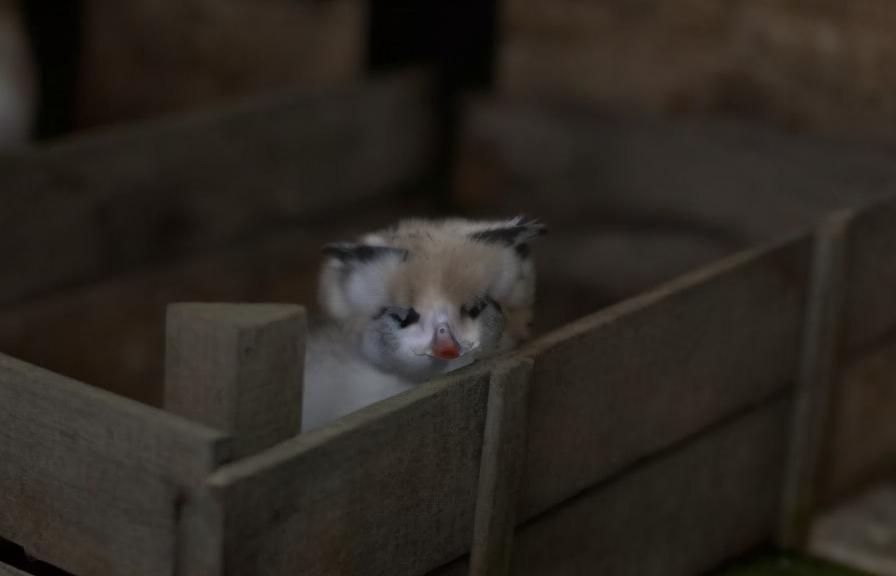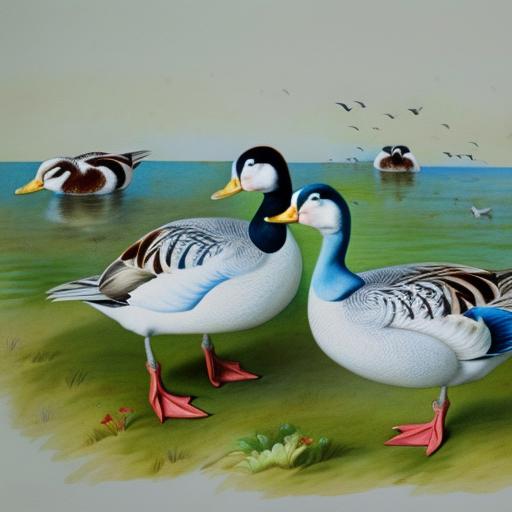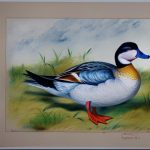Domestic ducks are a popular choice for backyard poultry enthusiasts and small-scale farmers due to their charming personalities, low maintenance requirements, and ability to provide eggs and meat. These waterfowl are descendants of wild ducks and have been domesticated for thousands of years. They are known for their adaptability to various climates and their ability to thrive in both rural and urban settings. Domestic ducks come in a wide range of breeds, each with its own unique characteristics and traits. Whether you are interested in raising ducks for eggs, meat, or simply as pets, there is a breed of domestic duck that will suit your needs.
Domestic ducks are social animals that thrive in the company of other ducks or even other poultry species. They are known for their friendly and curious nature, making them a joy to have around the farm or backyard. Ducks are also excellent foragers and can help control pests in the garden or on the farm. With proper care and housing, domestic ducks can live for 8-12 years, making them a long-term commitment for those interested in adding them to their flock. In this article, we will explore the popular breeds of domestic ducks, their characteristics and temperament, housing and care requirements, breeding and reproduction, as well as common health issues and considerations for keeping domestic ducks.
Key Takeaways
- Domestic ducks are popular backyard pets and can provide eggs, meat, and pest control.
- Popular breeds of domestic ducks include the Pekin, Khaki Campbell, and Indian Runner.
- Domestic ducks are known for their friendly and social nature, as well as their ability to forage for food.
- Proper housing and care for domestic ducks includes providing a secure coop, access to water for swimming, and a balanced diet.
- Breeding and reproduction of domestic ducks involves providing nesting boxes and ensuring proper incubation conditions.
Popular Breeds of Domestic Ducks
There are numerous breeds of domestic ducks, each with its own unique characteristics and traits. Some of the most popular breeds include the Pekin, Khaki Campbell, Indian Runner, Rouen, and Muscovy ducks. The Pekin duck is one of the most common breeds raised for meat production due to its rapid growth rate and large size. They have white feathers and orange bills and feet, making them easily recognizable. The Khaki Campbell is a popular breed for egg production, known for its high egg-laying capabilities, often laying over 300 eggs per year. They have a khaki-colored plumage and are known for their friendly and sociable nature.
The Indian Runner duck is a unique breed known for its upright stance and distinctive walking style. They are excellent layers and come in a variety of colors including white, fawn, and black. The Rouen duck is a large breed with stunning plumage that resembles the wild Mallard duck. They are often raised for both meat and eggs and are known for their calm and friendly temperament. The Muscovy duck is a popular breed for meat production due to its lean and flavorful meat. They are also excellent foragers and are known for their ability to control pests in the garden or on the farm. Each breed of domestic duck has its own unique qualities and characteristics, making it important to research and choose the breed that best suits your needs and preferences.
Characteristics and Temperament of Domestic Ducks
Domestic ducks are known for their friendly and sociable nature, making them a joy to have around the farm or backyard. They are highly social animals that thrive in the company of other ducks or even other poultry species. Ducks are also known for their curious and inquisitive personalities, often exploring their surroundings with great enthusiasm. They are excellent foragers and can help control pests in the garden or on the farm, making them a valuable addition to any small-scale farming operation.
Each breed of domestic duck has its own unique characteristics and temperament. For example, Pekin ducks are known for their calm and gentle nature, making them an excellent choice for families with children. Khaki Campbell ducks are highly active and energetic, often seen foraging and exploring their environment. Indian Runner ducks are known for their upright stance and distinctive walking style, making them a unique and interesting addition to any flock. Rouen ducks are calm and friendly, while Muscovy ducks are known for their independent nature. Understanding the characteristics and temperament of each breed is important when choosing the right ducks for your flock.
Housing and Care for Domestic Ducks
Proper housing and care are essential for the health and well-being of domestic ducks. Ducks require a secure shelter to protect them from predators, as well as access to fresh water for swimming and drinking. A duck house should provide ample space for the ducks to move around comfortably, as well as nesting boxes for egg-laying breeds. The flooring should be covered with straw or shavings to provide a soft and comfortable surface for the ducks to walk on.
Ducks also require access to a pond or shallow water source for swimming and bathing. This is essential for maintaining healthy feathers and skin, as well as providing enrichment for the ducks. If a natural pond is not available, a kiddie pool or shallow tub can be used to provide water for swimming. Ducks also require access to a balanced diet that includes commercial duck feed, as well as fresh fruits and vegetables. It is important to provide adequate nutrition to support the health and productivity of the ducks.
In addition to proper housing and nutrition, ducks also require regular health checks and preventative care to ensure they remain healthy and free from disease. This includes regular vaccinations, parasite control, and monitoring for signs of illness or injury. Providing proper housing and care for domestic ducks is essential for their health and well-being, as well as the productivity of egg-laying breeds.
Breeding and Reproduction of Domestic Ducks
Breeding domestic ducks can be a rewarding experience for small-scale farmers and backyard poultry enthusiasts. Ducks reach sexual maturity at around 5-7 months of age, at which point they will begin laying eggs. The breeding season typically begins in the spring when daylight hours increase, triggering the ducks’ natural breeding instincts. It is important to provide nesting boxes filled with straw or shavings to encourage egg-laying behavior.
Ducks are known for their broody nature, meaning they will often sit on a clutch of eggs until they hatch. However, some breeds of ducks have been bred to be less broody in order to maximize egg production. If you are interested in hatching ducklings, it is important to provide a safe and warm environment for the eggs to incubate. This can be done using an incubator or by allowing a broody duck to sit on the eggs.
Once the ducklings hatch, they will require warmth, protection, and access to food and water. It is important to provide a safe environment free from predators, as well as access to a balanced diet to support healthy growth and development. Breeding domestic ducks can be a rewarding experience that allows you to raise your own flock of ducks from hatchlings to adults.
Health and Common Issues in Domestic Ducks

Like all animals, domestic ducks are susceptible to a variety of health issues that can impact their well-being. Common health issues in domestic ducks include respiratory infections, parasites, bumblefoot, and nutritional deficiencies. Respiratory infections can be caused by poor ventilation or exposure to damp conditions, leading to symptoms such as coughing, sneezing, and nasal discharge. Parasites such as mites and lice can cause irritation and discomfort for ducks, leading to feather loss and skin irritation.
Bumblefoot is a condition caused by bacteria entering through small cuts or abrasions on the feet, leading to swelling and infection. Nutritional deficiencies can occur if ducks are not provided with a balanced diet that meets their specific nutritional requirements. It is important to provide regular health checks for domestic ducks to monitor for signs of illness or injury.
Preventative care is essential for maintaining the health of domestic ducks, including regular vaccinations, parasite control, and access to a balanced diet. Providing proper housing that is clean and dry can also help prevent respiratory infections and bumblefoot. It is important to provide access to fresh water for swimming and drinking, as well as regular grooming to maintain healthy feathers and skin.
Conclusion and Considerations for Keeping Domestic Ducks
In conclusion, domestic ducks are charming waterfowl that make a wonderful addition to any small-scale farming operation or backyard poultry flock. With their friendly nature, ability to control pests, and ability to provide eggs and meat, domestic ducks offer numerous benefits for those interested in raising them. When considering adding domestic ducks to your flock, it is important to research the various breeds available and choose the breed that best suits your needs and preferences.
Proper housing and care are essential for the health and well-being of domestic ducks, including access to secure shelter, fresh water for swimming and drinking, balanced nutrition, regular health checks, preventative care, and grooming. Breeding domestic ducks can be a rewarding experience that allows you to raise your own flock from hatchlings to adults. However, it is important to be prepared for the responsibilities of breeding and caring for ducklings.
Overall, domestic ducks are delightful animals that offer numerous benefits for those interested in raising them. With proper housing, care, breeding considerations, health monitoring, preventative care measures in place, domestic ducks can thrive in various environments while providing joy and productivity to those who raise them.
Overall, domestic ducks are delightful animals that offer numerous benefits for those interested in raising them. With proper housing, care, breeding considerations, health monitoring, and preventative care measures in place, domestic ducks can thrive in various environments while providing joy and productivity to those who raise them. Whether for their eggs, meat, pest control abilities, or simply as charming companions, domestic ducks can bring a lot of value to a homestead or farm. Additionally, their friendly and curious nature can make them enjoyable pets for those looking to add some feathered friends to their lives.
If you’re interested in learning more about the breeding and care of domestic ducks, you may want to check out an article on PoultryWizard.com that discusses the mating season for ducks. This informative piece provides valuable insights into the timing and behavior of duck mating, which can be crucial for breeders and duck enthusiasts. You can find the article here.
FAQs
What are the different breeds of domestic ducks?
There are many different breeds of domestic ducks, including the Pekin, Mallard, Rouen, Khaki Campbell, Indian Runner, and Muscovy, among others.
What are the characteristics of different duck breeds?
Each breed of domestic duck has its own unique characteristics, including size, coloration, and temperament. For example, Pekin ducks are large, white ducks with orange bills, while Indian Runner ducks are slender and upright with a variety of color patterns.
What are the purposes of keeping domestic ducks?
Domestic ducks are kept for a variety of purposes, including egg production, meat, pest control, and as pets. Some breeds are specifically bred for their egg-laying abilities, while others are raised for their meat.
What do domestic ducks eat?
Domestic ducks typically eat a diet of commercial duck feed, supplemented with fresh greens, insects, and other treats. They also require access to clean water for drinking and bathing.
How do you care for domestic ducks?
Caring for domestic ducks involves providing them with a suitable living environment, proper nutrition, access to water for swimming and bathing, and protection from predators. Regular health checks and vaccinations may also be necessary.
Are domestic ducks good pets?
Domestic ducks can make good pets for people who have the space and resources to care for them properly. They are social animals that can form strong bonds with their human caregivers and can be quite entertaining to watch. However, they do require a commitment to their care and maintenance.
Meet Walter, the feathered-friend fanatic of Florida! Nestled in the sunshine state, Walter struts through life with his feathered companions, clucking his way to happiness. With a coop that’s fancier than a five-star hotel, he’s the Don Juan of the chicken world. When he’s not teaching his hens to do the cha-cha, you’ll find him in a heated debate with his prized rooster, Sir Clucks-a-Lot. Walter’s poultry passion is no yolk; he’s the sunny-side-up guy you never knew you needed in your flock of friends!







